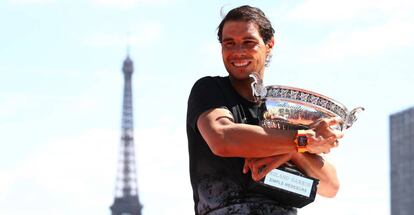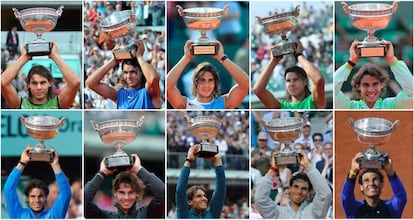“I am not obsessive about winning:” Rafa Nadal
Spanish tennis player says the hardest part of last few years has been string of injuries

A day after winning a historic 10th French Open title, Rafa Nadal spoke to Spanish media outlets during a cruise along the River Seine in Paris.
“I haven’t slept much to be honest, but not because I was partying,” he said, explaining his sleeplessness as the product of adrenaline in the wake of his victory.
I’m not sure if I could beat the 2008 version of me now, but I don’t even think about it
Nadal, who is wearing a watch with the colors of the Spanish flag and a sponsor’s T-shirt, says he is content and satisfied. But above all is he is celebrating his fitness after a long string of injuries. He is also attempting to normalize his extraordinary feat. “I wasn’t as finished [as people said] six months ago, and I am not so good now,” he says.
“I don’t get euphoric when things go really well and I am not very negative when they go badly. I am more or less stable. I try and accept what’s happening calmly without making a big drama out of things,” says the tennis player who now has 15 Grand Slam titles to his name. “This perspective works for me and helps me to move forward.”
Asked how he feels about being a legend at age 31, Nadal downplays the idea. “It’s not something that worries me and I enjoy everyday life. I am thankful for all the affection people give me – even when they are critical, as long as they are respectful. I know the career I have had is something very special but I am not going start thinking I am something different than what I’ve always thought myself to be,” he says.

“I know these things happening to me now are fleeting and in a few years not so far off from now, I will be a normal person again,” he adds.
Nadal is also willing to accept it hasn’t all been easy – especially the injuries that have blighted his career. “People see me as obsessive about winning but I am not, honestly. What has been oddest for me is that I haven’t been able to compete for months at a time,” he explains.
People see me as obsessive about winning but I am not
“There are a lot of blows along the way and in the end, it’s normal that this destabilizes you. The important thing is for you to still have the desire and the motivation to continue,” says Nadal.
The Mallorcan is not sure if he has become a better player, although he does recognize, looking back on his earlier victories, that while he has lost a certain physical intensity, other aspects of his game have improved. “I have improved my backhand and my service a lot in the last few years, and my understanding of the game too,” he says. “I have included some things in my game and lost others. Clearly the physical aspect isn’t as good but I think I am still a good player physically,” he explains.
“I’m not sure if I could beat the 2008 version of me now, but I don’t even think about it.”
In 2005 I destroyed my left foot in the Madrid Open final and that’s when all my problems started
Half an hour into his interview, Nadal goes back to an episode that could have changed his whole career. “In 2005 I destroyed my left foot at the Madrid Open final and that’s when all my problems began, because I had to start playing with a major corrective inner sole to protect my foot. The doctors told me it could end my career – that’s the truth,” says Nadal stating his amazement that his foot can still deal with all the punishment it receives.
Nadal concludes by thanking all the people who have helped him on an everyday basis. “When you have been through difficult times, you learn to know the price that you pay. The problem isn’t just losing a tournament: it’s starting from scratch again with pain everywhere. I am happy that I have kept the fire alive to go and train everyday with the necessary passion. What I am happiest about is that I can keep doing what I love doing, which is playing tennis.”
English version by George Mills.
Tu suscripción se está usando en otro dispositivo
¿Quieres añadir otro usuario a tu suscripción?
Si continúas leyendo en este dispositivo, no se podrá leer en el otro.
FlechaTu suscripción se está usando en otro dispositivo y solo puedes acceder a EL PAÍS desde un dispositivo a la vez.
Si quieres compartir tu cuenta, cambia tu suscripción a la modalidad Premium, así podrás añadir otro usuario. Cada uno accederá con su propia cuenta de email, lo que os permitirá personalizar vuestra experiencia en EL PAÍS.
¿Tienes una suscripción de empresa? Accede aquí para contratar más cuentas.
En el caso de no saber quién está usando tu cuenta, te recomendamos cambiar tu contraseña aquí.
Si decides continuar compartiendo tu cuenta, este mensaje se mostrará en tu dispositivo y en el de la otra persona que está usando tu cuenta de forma indefinida, afectando a tu experiencia de lectura. Puedes consultar aquí los términos y condiciones de la suscripción digital.









































